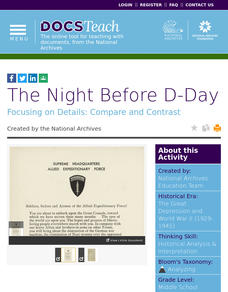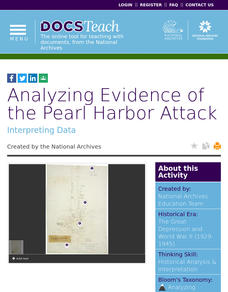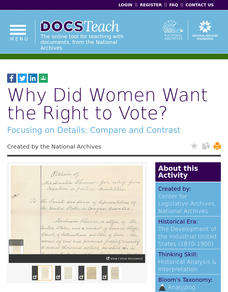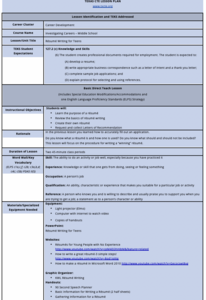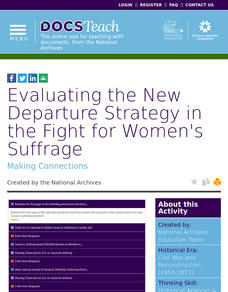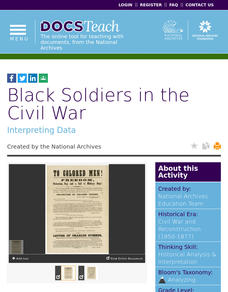DocsTeach
The School Lunch Program and the Federal Government
The school lunch program is rooted in the struggles of the Great Depression and is still assisting families today. Academics research documents and images relating to the creation of the school lunch program. Scholars use a worksheet to...
DocsTeach
The Night Before D-Day
Get inside the mind of General Eisenhower regarding the D-Day invasion. An interesting activity uses historical documents to highlight the differences between Eisenhower's public stance on D-Day and his private opinions. Scholars analyze...
DocsTeach
Letter to Truman about the Manhattan Project
Delve into the past to understand the opposition to the Manhattan Project. An interesting activity is designed to be completed in pairs, groups, or individually. Scholars analyze historical documents, complete an online worksheet, and...
DocsTeach
Analyzing Evidence of the Pearl Harbor Attack
Don some detective caps and delve into the past to explore the evidence left behind after the attack on Pearl Harbor. An interesting activity uses primary sources to explore how the United States Navy was caught off guard and how the...
National Park Service
Lesson 1: Journaling with Songs of Freedom
There's more to music than a memorable tune. The songs of those who were enslaved reveal the harsh realities of their lives. Using both songs and slave narratives, historians uncover this hidden history. The lesson incorporates a variety...
DocsTeach
Why Did Women Want the Right to Vote?
No taxation without representation may have been the battle cry of the American Revolution, but women used the same argument when demanding their right to vote in the late 1800 and early 1900s. Young historians examine petitions from...
DocsTeach
The Settlement of the American West
What do Abraham Lincoln and the Transcontinental Railroad have in common? Using a set of primary source documents, including pictures, maps, and treaties, class members link together the common themes of expansion into the American West....
DocsTeach
Suffragist Susan B. Anthony: Petitioning for the Right to Vote
What is the best way to get a point across: a petition or a protest? Using primary sources, including a petition from Susan B. Anthony and a photo of a White House protest from the early 1900s, young historians examine what women did to...
DocsTeach
Reasons for Westward Expansion
"Go West, young man!" is a familiar refrain in American history. But why did people leave their homes in the East to travel westward and what impact did that movement have on people already living in the American West? By examining...
DocsTeach
Patent Analysis: J.W. Davis and Levi Strauss's Fastening Pocket Openings
Commonplace today, the zipper and button construction of blue jeans was a major innovation. Using the patent for the J.W. Davis and Levi Strauss innovation, individuals comb an image of the fly for clues. Afterward, they discuss its...
DocsTeach
To What Extent was Reconstruction a Revolution? (Part 1)
Some scholars consider the Civil War and Reconstruction a second American Revolution. Class members weigh in after examining primary sources, including a Congressional resolution calling for the Fifteenth Amendment and the credentials of...
Texas Education Agency (TEA)
Résumé Writing for Teens
Writing a resume is as easy as 1-2-3. Teens learn the basics of resume writing by viewing a PowerPoint and completing a KWL chart. Next, they type and submit their resumes.
DocsTeach
Analyzing a Map of the Louisiana Purchase
With the stroke of a pen, Thomas Jefferson roughly doubled the size of the United States. The Louisiana Purchase not only grew the new country, but also it gave rise to the legends surrounding westward expansion and accelerated the...
DocsTeach
Election of 1800
The 2020 election is not the only unpredictable one in history. The Election of 1800 highlighted an unforeseen event in a presidential election. The activity reviews documents from the elections and what happened when the electoral...
DocsTeach
Deborah Sampson Gannett: A Woman Soldier in the Revolutionary War
Fact or fiction: Women fought as soldiers in the Revolutionary War. The resource highlights the life of Deborah Sampson Gannett, a woman who disguised herself as a man to fight during the war. Academics decipher a legal document and...
DocsTeach
Comparing the Magna Carta and English Bill of Rights with the U.S. Bill of Rights
Just how alike are some historical documents? Discover the similarities between the Magna Carta and the United States Bill of Rights in a fast-paced activity. Historians learn the importance of both documents and the lasting impact they...
DocsTeach
Analyzing a Petition about Slavery
Practice analyzing primary sources in a thought-provoking lesson on the impact of slavery. Young historians read a petition regarding the Fugitive Slave Law and answer a series of questions to understand the importance of the document....
DocsTeach
Letter to President Abraham Lincoln from Annie Davis
What freed enslaved people? The answer, it turns out, is complicated. Using a set of online documents and writing prompts, young historians examine a series of primary sources, including a letter from a woman asking if she was freed and...
DocsTeach
Juneteenth General Order
While Juneteenth was more than 150 years ago, today Americans debate whether it should be a national holiday. Using a military declaration proclaiming the last of the enslaved people in Texas free, individuals look at the significance of...
DocsTeach
How Effective were the Efforts of the Freedmen’s Bureau?
The legacy of Reconstruction and the Freedman's Bureau is complicated. Using an interactive web resource, learners literally weigh the evidence using an online program in primary sources such as labor contracts and marriage records to...
DocsTeach
From Dred Scott to the Civil Rights Act of 1875: Eighteen Years of Change
What do a photo of Abraham Lincoln, a map for the Battle of Antietam, and the Dred Scott decision all have in common? Learners consider the broader question as they examine documents related to civil rights during the Civil War and...
DocsTeach
Evaluating the New Departure Strategy in the Fight for Women's Suffrage
When women demanded their right to vote, did the Constitution already protect it? The New Departure Strategy in the women's suffrage movement made this claim through court hearings. Using documents, such as transcripts from Susan B....
DocsTeach
Comparing Civil War Recruitment Posters
African Americans fought in the Civil War, and they were recruited by both the Union and the Confederacy! By comparing the wording of posters—one directed at freedmen and another to the owners of enslaved people—young historians discover...
DocsTeach
Black Soldiers in the Civil War
Get hands on virtually with recruitment posters for African American soldiers during the Civil War with an interactive online resource. By highlighting key phrases in the posters using an Internet tool, learners discover how African...



